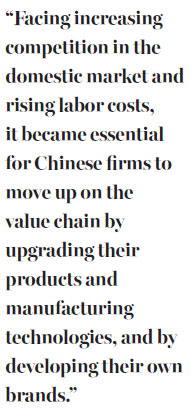As protectionism rises, China may face new problems
Fifteen years after its accession to the World Trade Organization, China's inward foreign direct investment stock has multiplied by six times, with a compound annual growth rate of 14 percent. More dramatically, its outward FDI stock increased 27 percent per year in the same period, indicating its emergence as the second-largest source of FDI after the US.
The rapid growth of China's inward and outward FDI clearly contrasts with the global trend in FDI, which has experienced a significant downturn, especially since the economic crisis occurred in 2008.
China's success in both inward and outward FDI is strongly related to its achievements in economic transformation in general and to its efforts in deregulating FDI to meet WTO compliance in particular.
Over past two decades, China's FDI policies have seen continuous deregulation with regard to the ownership control, geographical location and sectoral restrictions. The accession to the WTO has led to a reduction in tariffs, elimination of quotas on exports and a reduction in barriers to the cross-border supply of services, while the transformation of the Chinese economic system has changed the competitive landscape in China and thus increased the competitiveness of Chinese firms in the world market.
Access to the service sector was a focal point for the US and EU in negotiating WTO accession for China, as this has been of paramount importance to US and European companies in their dealings with China.

Recent developments show a convergence of both Chinese and Western interests in promoting FDI in the service sectors.
Over the past decade, China's inward FDI has declined in the manufacturing industry - especially in export processing activities - because of rising labor costs. Yet, this decline has been largely compensated by increasing FDI flows in the service industry, especially in retailing, banking and the insurance sector.
Given the fact that China is rapidly turning into a service economy, foreign service multinationals are expected to further invest in projects focusing on consumer services.
Another substantial change is the increasing potential for foreign multinationals to participate in China's emerging sectors, which are driven by innovation and technology, such as e-commerce, medical devices and high-end manufacturing. By contrast, traditional sectors with intensive labor inputs and overcapacity, such as the steel, shipbuilding, real estate and industrial products sectors, will be restricted.
With regard to the impact of WTO accession on China's outward FDI, the surge of the country's foreign exchange reserves and the mounting pressure of competition in the domestic market convinced the government and Chinese companies of the necessity to build up global competitive advantages in order to sustain economic growth.
Actually, the "go abroad" strategy was initiated to anticipate and be able to cope with growing competition in domestic markets as a result of China's accession to the WTO in 2001.
Facing increasing competition in the domestic market and rising labor costs, it became essential for Chinese firms to move up on the value chain by upgrading their products and manufacturing technologies, and by developing their own brands. These firms, especially the large private industrial ones, backed by their large-scale production and huge sales volume in China, turned to Western countries in their search for technology, brands and markets.
As part of their cost leadership strategy, these firms attempt to acquire core technology and assets (such as in the case of Kraussmaffei Group and Gimatic), to occupy key positions in the global value chain, to create (think acquisition of Syngenta by Chinachem) and to tap into global production, transportation and financial hubs (for example, COSCO in Antwerp).
The WTO accession has substantially affected the Chinese inward and outward FDI landscape, while the active participation of China in global trade and investment governance has significantly contributed to its effective coordination and monitoring of both inward and outward FDI.
Yet, facing increasing economic protectionism and nationalism, new challenges could be emerging for China, especially at its turning point of becoming a service-oriented and knowledge-based economy.
The authoer is a professor and director of the Neoma Business School-Confucius Institute in France. The views do not necessarily reflect those of China Daily.
(China Daily European Weekly 12/16/2016 page8)


















